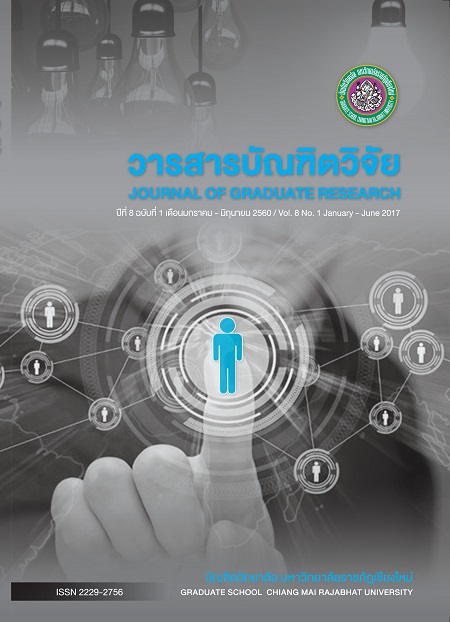ผลการใช้เกมกลางแจ้งโดยใช้สมองเป็นฐานที่มีต่อสมรรถภาพทางกลไกของเด็กปฐมวัยโรงเรียนสาธิตมหาวิทยาลัยราชภัฏเชียงใหม่
Main Article Content
Abstract
การวิจัยในครั้งนี้ มีวัตถุประสงค์เพื่อ 1) เปรียบเทียบสมรรถภาพทางกลไกของเด็กปฐมวัยโรงเรียนสาธิตมหาวิทยาลัยราชภัฏเชียงใหม่ ก่อนและหลังการจัดกิจกรรมเกมกลางแจ้งโดยใช้สมองเป็นฐาน และ 2) เปรียบเทียบสมรรถภาพทางกลไกของเด็กปฐมวัยโรงเรียนสาธิตมหาวิทยาลัยราชภัฏเชียงใหม่ที่ได้รับการจัดกิจกรรมเกมกลางแจ้งโดยใช้สมองเป็นฐานกับกลุ่มที่ได้รับการจัดกิจกรรมกลางแจ้งตามปกติ กลุ่มตัวอย่างที่ใช้ในการวิจัยได้แก่ เด็กปฐมวัยที่มี อายุ 5-6 ปี จำนวน 51 คน ที่เรียนชั้นอนุบาลปีที่ 3 ภาคเรียนที่ 2 ปีการศึกษา 2558 โรงเรียนสาธิตมหาวิทยาลัยราชภัฏเชียงใหม่ แบ่งออกเป็น 2 กลุ่ม คือ กลุ่มทดลอง จำนวน 24 คน และกลุ่มควบคุม จำนวน 27 คน ได้มาโดยการสุ่มแบบกลุ่ม เครื่องมือที่ใช้ในการวิจัย ได้แก่ แผนการจัดกิจกรรมเกมกลางแจ้งโดยใช้สมองเป็นฐานแบบทดสอบสมรรถภาพทางกายสำหรับเด็กไทยระดับก่อนประถมศึกษาอายุ 4-6 ปี สถิติที่ใช้ในการวิเคราะห์ข้อมูล ได้แก่ ค่าเฉลี่ย ส่วนเบี่ยงเบนมาตรฐาน และการทดสอบค่าที
ผลการวิจัย พบว่า 1) เด็กปฐมวัยโรงเรียนสาธิตมหาวิทยาลัยราชภัฏเชียงใหม่ที่ได้รับการจัดกิจกรรมเกมกลางแจ้งโดยใช้สมองเป็นฐานมีสมรรถภาพทางกลไกสูงกว่าก่อนการทดลอง อย่างมีนัยสำคัญทางสถิติที่ระดับ .05 และ 2) เด็กปฐมวัยโรงเรียนสาธิตมหาวิทยาลัยราชภัฏเชียงใหม่ที่ได้รับการจัดกิจกรรมเกมกลางแจ้งโดยใช้สมองเป็นฐานมีสมรรถภาพทางกลไกสูงกว่ากลุ่มที่ได้รับการจัดกิจกรรมกลางแจ้งตามปกติ อย่างมีนัยสำคัญทางสถิติที่ระดับ .05
THE EFFECTS OF BRAIN – BASED OUTDOOR ACTIVITIES ON MOTOR FITNESS OF PRESCHOOL CHILDREN AT RAJABHAT CHIANG MAI UNIVERSITY DEMONSTRATION SCHOOL
The objectives of this research were (1) to compare motor fitness levels of preschool children at Rajabhat Chiang Mai University Demonstration School before and after partaking in brain-based outdoor activities; and (2) to compare the post-experiment motor fitness level of the preschool children in the group that partook in brain-based outdoor activities with the post-experiment counterpart level of the group that partook in conventional outdoor activities.
The research sample comprised 51 preschool children, 5-6 years old, in two intact third kindergarten classrooms of Rajabhat Chiang Mai University Demonstration School in the second semester of the 2015 academic year, obtained by cluster sampling. Then one classroom consisting of 24 children was randomly assigned by drawing lots as the experimental group; while the other classroom consisting of 27 children, the control group. The employed research instruments were experience management plans for brain-based outdoor activities, and a physical fitness test for Thai preschool children, aged 4-6 years. Statistics employed for data analysis were the mean, standard deviation, and t-test.
The research findings revealed that (1) the post-experiment fitness motor level of the experimental group preschool children at Rajabhat Chiang Mai University Demonstration School, who partook in brain-based outdoor activities, was significantly higher than their pre-experiment counterpart level at the .05 level of statistical significance; and (2) the post-experiment fitness motor level of the experimental group preschool children who partook in brain-based outdoor activities was significantly higher than the post-experiment counterpart level of the control group preschool children who partook in conventional outdoor activities at the .05 level of statistical significance.


